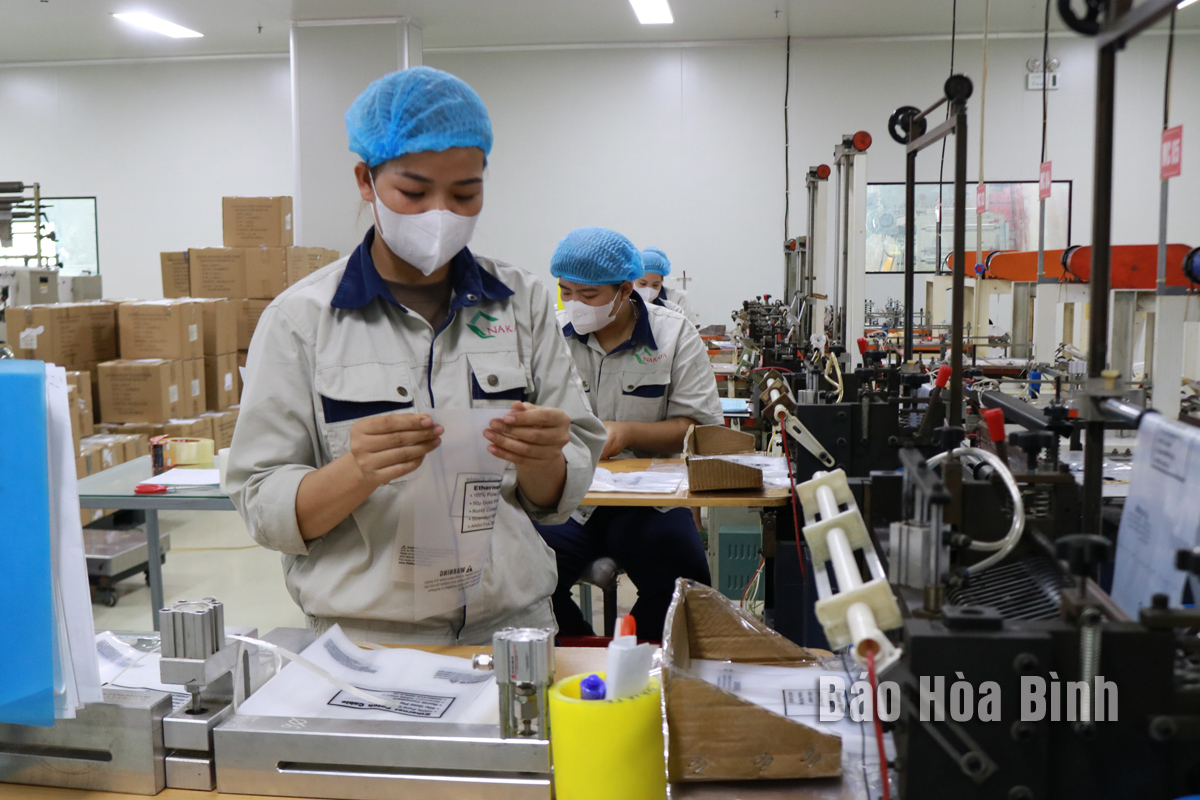
May 2025 marked a pivotal moment in Vietnam’s national development journey as the Politburo issued Resolution 68 on the development of the private economy. More than just a policy directive, this resolution represents a revolution in economic thinking and institutional reform, paving a promising "avenue” for the private sector’s growth.
In Hoa Binh province, the private sector substantially contributes to the local economy, helping with job creation and poverty reduction. (Photo: Workers earn stable incomes at Phu Thanh II Industrial Cluster, Lac Thuy district)
For the first time in Vietnam’s economic development history, the private sector’s role is elevated to a strategic level under Resolution 68: the private sector is the most important driving force of the national economy. Alongside the state and collective economy sectors, the private economy is seen as a cornerstone in building an independent, self-reliant, and deeply integrated economy.
Since its introduction, Resolution 68 has generated widespread positive momentum, with high hopes that it will unlock societal resources and reinforce public confidence in the Party’s clear-sighted leadership. Following Resolution 68, the 15th National Assembly passed Resolution 198 on the development of the private sector, effective from May 17, 2025. This resolution provides the central legal framework for long-term policies on private sector development. On May 30, Prime Minister Pham Minh Chinh signed a decision to establish the National Steering Committee for the implementation of Resolution 68, marking another critical step that underscores the political system’s determined and effective approach to translating the resolution into action.
Over the past month, the political system’s swift and serious engagement has demonstrated a strong commitment from the Party and State to build a conducive development environment, removing long-standing structural bottlenecks to enable the private sector to emerge as the most powerful driver of national prosperity.
In Hoa Binh province, the entire political system and the business community have embraced Resolution 68 with optimism, affirming that a broad "avenue” is now open for private enterprises. After a month of encouraging signals, both Hoa Binh and other localities across the country believe the time has come for the private sector to rise, not just as a slogan, but as an imperative from reality and a historic opportunity not to be missed.
Nevertheless, turning policy into practice is a long journey that demands utmost efforts and mettle. In applying Resolution 68 to the province’s specific economic context, Hoa Binh’s business community recognises that the private sector now enjoys a favourable starting point on this new avenue of development, backed by supportive policies and institutional frameworks.
To build further momentum and achieve a breakthrough, private enterprises must combine determination and innovation with the responsible partnership from the entire political system. Equally vital is the ambitious involvement of the people, an immense economic force that must be mobilised to unlock all societal potential and maximise productivity in the socialist-oriented market economy.
According to data from the Hoa Binh Provincial Party Committee, the industrial production index for the first six months of 2025 is estimated to have increased by 20% compared to the same period last year. This marks the highest year-on-year growth rate for this period since 2020.
In the first six months of 2025, Hoa Binh province’s export turnover was estimated at 1.145 billion USD, marking an 18.11% increase compared to the same period in 2024. Import turnover was estimated at $ 804 million, a 17.15% increase, which helped the province maintain a positive trade balance.
The lives of the ethnic minority farmers in Tan Lac district have gradually improved thanks to the new directions in agricultural production. This is a testament to the collective strength fostered through the professional associations and groups implemented by various levels of the district’s Farmers’ Union.
With the motto the "product quality comes first,” after nearly one year of establishment and operation, Muong village’s Clean Food Agricultural and Commercial Cooperative, located in Cau Hamlet, Hung Son Commune (Kim Boi district), has launched reputable, high-quality agricultural products to the market that are well-received by consumers. The products such as Muong village’s pork sausage, salt-cured chicken, and salt-cured pork hocks have gradually carved out a place in the market and they are on the path to obtaining the OCOP certification.
In the past, the phrase "bumper harvest, rock-bottom prices" was a familiar refrain for Vietnamese farmers engaged in fragmented, small-scale agriculture. But today, a new spirit is emerging across rural areas of Hoa Binh province - one of collaboration, organisation, and collective economic models that provide a stable foundation for production.
Maintaining growing area codes and packing facility codes in accordance with regulations is a mandatory requirement for agricultural products to be eligible for export. Recently, the Department of Agriculture and Environment of Hoa Binh province has intensified technical supervision of designated farming areas and packing facilities to safeguard the "green passport" that enables its products to access international markets.



